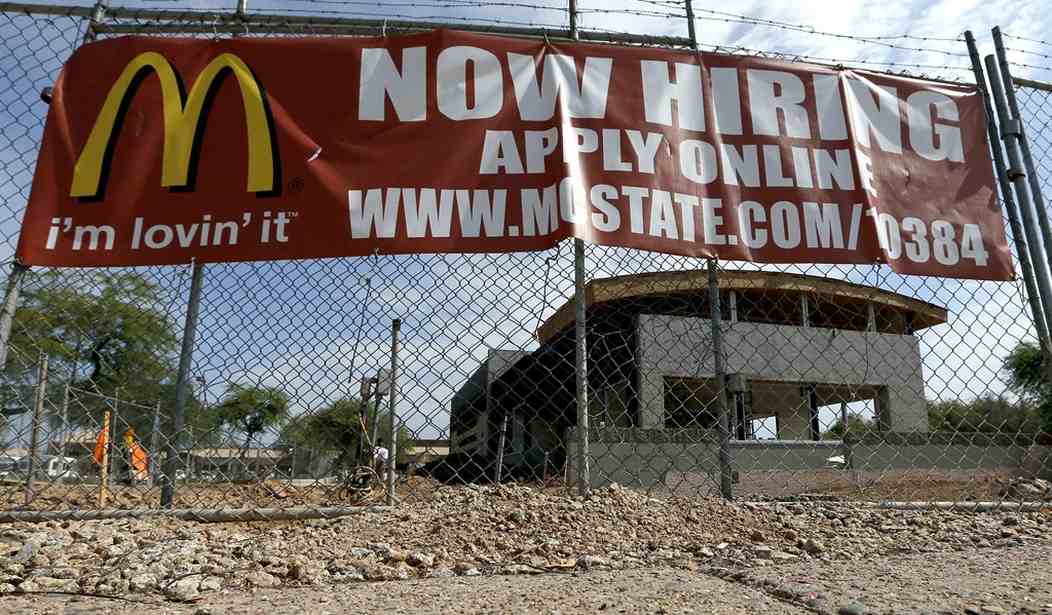WASHINGTON - All of the euphoric stories you've read lately about the surging job market should include one of these cautionary notes: This report omits all negative data, or "read down to the very bottom where we've buried the bad stuff."
Consider the Washington Post's front page headline last week that gushingly characterized the Labor Department's minimal monthly employment numbers as a "jobs boom."
The Bureau of Labor Statistics says that the economy produced 280,000 new jobs in May. But this isn't anywhere near a hiring boom, especially in a country of nearly 160 million workers, many of whom still can't find a good full-time job.
In 1983, after a severe recession when unemployment climbed to more than 10 percent at one point, the Reagan economy created 1.1 million jobs just in September. That's a jobs boom.
But this isn't. Not when "there are still more than 8.6 million workers without jobs who want them," says the Business Insider web site.
To be fair, the Post admitted that not everything was coming up roses, and that "there is room for improvement" on the jobs front. But it buried those negative figures at the end of a very long story.
Among them:
"About 2.5 million people have been out of work for six months or longer, while nearly 7 million are in part-time jobs even though they would like [and need] full-time positions…"
"You've got a lot of people who are trading one struggle, which is unemployment, for another struggle, which is underemployment," Jason Richardson, research director at the National Community Reinvestment Coalition, told the Post.
This is still a weak economy that can't seem to get its economic growth rate above the 2 to low 3 percent range -- where the really big employment numbers come from.
Recommended
But with the Obama economy's growth rate plunging to minus 0.7 percent in the first quarter, economists aren't looking for a strong job surge anytime soon.
Global forecasters look at President Obama's dismal record and wonder why the largest economy in the world cannot break out of its economic lethargy.
The International Monetary Fund said last week that it doesn't see the U.S. economy doing any better than, at best, a pathetic 2.5 percent this year.
In fact, the IMF's forecast for the U.S. was so dour that it urged the Federal Reserve to delay raising interest rates until mid-2016 because of the economy's subpar performance.
U.S. business executives are just as pessimistic about the economy's future, according to a survey of 128 CEOs for the Business Roundtable's Economic Outlook report.
Its findings: The country's CEOs say they intend to hire and invest at a significantly lower rate over the next six months.
Equally worrisome, they're forecasting that the Obama economy will expand at a tepid 2.5 percent this year.
"These results are consistent with an economy that operates below its potential capacity," said Randall Stephenson, chairman and CEO of AT&T, in a conference call with reporters.
"Industrial production is down… and we view that as a concern," he said.
Driving the CEOs' pessimism is their fear that Obama will not get his trade negotiating authority, known as "fast track," through Congress, or comprehensive tax reform to bring down corporate tax rates.
A majority of the nation's top executives said approval of a major trade agreement that opens broader access to global markets would result in a burst of hiring this year.
"There are a number of facets forecasting lower [capital expenditures by businesses], but none are surprising," Stephenson said.
"Oil and gas are big influences. But investments on everything from equipment to structures to intellectual property are running down…and there is some aggressive regulatory oversight that is causing businesses to slow down," he said.
But it isn't just big business that's worried about a lack of capital investment, the mother's milk of job creation. So is the vast majority of Americans whose jobs are on the line.
A recent Washington Post/ABC News poll found that more than 7 out of 10 Americans were worried about the declining economy.
The Federal Reserve's own economic survey, known as the Beige Book, revealed some of the reasons why.
Almost half of those who were surveyed [47 percent] said they did not have enough money set aside to cover an unexpected emergency costing $400 or more.
Nearly a third said they had to forgo needed medical care because they could not afford it.
More than one-third of all workers and 49 percent of part-time employes, said they needed and would prefer to work more hours at their present wage.
Seven years into Obama's presidency, the recession of 2008 still troubles millions of Americans who continue to struggle to find work and to earn enough money to pay their bills and feed their family.
"Even among college graduates, the jobless rate is significantly higher than it was during the boom years," writes the Post's economics reporter Ylan Q. Mui.
The Gallup Poll daily tracks how Americans are doing in this economy in terms of jobs, incomes and survival. Its findings tell a tragic story of how our government leaders and their impotent and often harmful policies have hurt our country and its people.
Gallup reported Wednesday that nearly 15 percent of Americans they surveyed were underemployed and that 36 percent were worried about money and making ends meet.
This is the economy Obama has imprisoned us in, and it won't get any better until this administration is replaced by a leader who knows how stimulate business investment and economic growth to put us back on the road to a full employment recovery.






















Join the conversation as a VIP Member